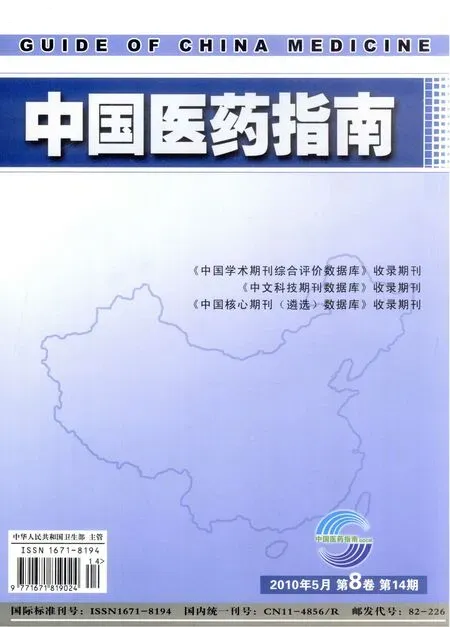EGFR-TKI在恶性肿瘤治疗中应用情况概述
刘继红 黄绮丹
中山大学肿瘤防治中心妇科(510060)
表皮生长因子受体(epidermal growth factor receptor,EGFR)是一种广泛分布于人体各组织细胞膜上的多功能糖蛋白,是HER/ErbB 家族成员之一。它与其配体结合后在细胞表面形成二聚体,使内在的蛋白激酶活化,酪氨酸激酶磷酸化使信号下传。激活下游的各个信号通路,最终介导细胞分化、生存、迁移、侵袭、黏附和细胞损伤修复等一系列过程。在肿瘤细胞中,EGFR往往是被过度激活而促进细胞分裂增殖,使肿瘤细胞的活动、黏附、侵袭能力增强,在肿瘤的发生和进展中起着重要作用。目前,针对EGFR的靶向治疗药物主要有两类:EGFR单抗和EGFR酪氨酸激酶抑制剂(EGFR tyrosine kinase inhibitor,EGFR-TKI),EGFR-TKI是通过作用在EGFR形成二聚体后阻止酪氨酸的磷酸化使下游通路无法激活,阻断EGFR信号转导途径,从而达到治疗恶性肿瘤的目的。目前应用较广的EGFR-TKI主要有两种:Gefitinib(Iressa,ZD1839)和Erlotinib(Tarceva,OSI-774)。本文就EGFR-TKI在多种恶性肿瘤中的临床应用情况作一概述。
1 非小细胞肺癌
EGFR-TKI最早用于治疗非小细胞肺癌,也是所有恶性肿瘤中应用最多的。2003年5月,美国FDA批准Gefitinib用于紫杉醇/顺铂治疗后的晚期NSCLC的治疗,但多项随机临床试验发现该药并不能提高患者的生存率。因此,2005年6月,FDA宣布限制Gefitinib在非小细胞肺癌中的应用,指出其只能用于以往或现正从该药获益的患者[1]。2004年,Lynch和Paez等分别发现Gefitinib治疗有效的患者大多数有EGFR基因突变(18~21号外显子),变异基因主要发生于腺癌。此外,Paez等还发现EGFR突变类型主要为替代突变和缺失突变,且突变率女性多于男性,日本的患者多于美国患者[2,3]。同年,Pao等[4]发现相似的EGFR突变也与对Erlotinib敏感性相关。2006年,韩国学者Lee等[5]在主要是女性无吸烟患者群体中进行的Gefitinib治疗非小细胞肺癌的临床试验发现,其有效率较传统化疗方案大大提高,进一步确定了EGFR-TKI的应用人群。
2 颅脑肿瘤
神经胶质瘤是最常见的颅脑肿瘤之一。Rich等[6]学者在Gefitinib治疗复发性恶性神经胶质瘤的Ⅱ期临床试验报告中指出,尽管该临床试验中Ge fi tinib未能有显著的疗效(无1例完全缓解(complete remission,CR)或部分缓解(partial remission,PR),但其对延长无进展生存期(progression-free survival,PFS)、总生存期(overall survival,OS)及与其他药物合用时提高其他药物的疗效是有好处的。Prados等[7]的Ⅰ期临床试验发现,Erotinib单独使用或联合替莫唑胺治疗稳定或复发性恶性神经胶质瘤,在不良反应轻微的情况下肿瘤反应率为14%。Ⅱ期临床试验发现,虽然无显著改善无进展生存期及总生存期,但对改善肿瘤局部情况是有好处的[8]。
3 胰腺肿瘤
胰腺癌是对药物治疗的抵抗率较高的肿瘤之一,对进展期病例,用标准一线化疗药物Gemcitabine的中位生存期仅5~6个月。因此,寻求更优治疗方法成为必要。加拿大国家肿瘤中心的一项关于Erotinib联合Gemcitabine治疗进展期胰腺癌,与传统的单用Gemcitabine的标准治疗比较的Ⅲ期临床试验发现,尽管其两组间的中位总生存期并没有明显差别,但联合用药组的死亡风险比显著下降了[9]。另一关于Capecitabine联合Erlotinib治疗Gemcitabine抵抗的进展期胰腺癌的研究表明,此联合用药方案的反应率为10%,17%的患者治疗后出现CA19-9水平下降,不良反应与Gemcitabine方案基本相同,同时该研究测定了EGFR基因突变,并得出结论在胰腺癌中EGFR-TKI的疗效与突变并无明显联系[10]。
4 胃肠道肿瘤
Rojo等[11]关于Ge fi tinib用于进展期胃癌治疗的研究中发现,Ge fi tinib的应用在某些患者中可抑制肿瘤细胞的增殖,在某些患者可促进肿瘤细胞的凋亡。Erlotinib治疗胃食管连接处及胃体腺癌的Ⅱ期临床研究结果表明,所有入组病例肿瘤标本中均未发现EGFR基因突变,44例胃食管连接处的肿瘤1例经过治疗达到完全缓解及4例达到部分缓解,但胃体癌26例中无1例对治疗有反应,提示该药可能对胃食管连接处腺癌的治疗较胃体癌效果好[12]。
在复发性或进展期结直肠癌的治疗中,传统的多药联合化疗方案带来的中位生存期一直维持在20~22个月,众多学者在为寻求新的二线治疗方案而努力。已有多项研究证明,结直肠癌对Gefitinib单药或者联合化疗方案有治疗反应[13,14]。Townsley等[15]的研究指出,Erlotinib单独使用能使39%的患者维持平均为4个月的疾病稳定期,且其毒副作用均在可以接受的范围内。另有研究发现,Erlotinib联合其他化疗药物治疗以往化疗无效患者,仍能获得20%的部分缓解及64%的疾病稳定[16]。最近在一项Gefitinib联合传统的FOLFOX-4方案治疗进展期结直肠癌的研究中,肿瘤对该联合用药方案的反应率较传统方案高,但同时其毒副作用也较前增加,提示此联合方案是否推广应用仍要权衡利弊[17]。
5 乳腺癌
早在2003年,已有多位学者报道了单药Gefitinib治疗进展期乳腺癌,或用于不适合内分泌治疗的乳腺癌可以有部分获益,且不良反应可以忍受[18,19]。近年来的研究主要针对含Gefitinib的多药方案在乳腺癌中的应用。Gasparini对Gefitinib联合表柔比星周疗治疗有远处转移的乳腺癌研究的结果提示,此治疗方案可获得64.2%的疾病控制率,14例病例中有2例部分缓解,7例获得3个月以上的疾病稳定期,但治疗前后病例的生物学标志如ERBB2及EGFR的表达并无明显变化。Fountzilas等[20]在紫杉醇及卡铂联合化疗的传统方案中加入Gefitinib,研究结果提示疗效与未加Ge fi tinib比较无显著差异。Guarneri等[21]近期的研究表明,将Gefitinib加入到表柔比星和紫杉醇联合方案用于可手术的乳腺癌患者的术前化疗,可有效减小肿瘤负荷,59例中甚至有3例出现了病理上的完全缓解(对照组31例未加用Ge fi tinib者有1例达到病理完全缓解),但治疗前后生物学标记无明显变化。
6 妇科肿瘤
宫颈癌是妇科恶性肿瘤中发病率最高的一种疾病。对复发性宫颈癌,特别是首次治疗为放射治疗者,复发后的治疗非常困难。含顺铂的联合化疗方案是对复发性宫颈癌的常用化疗方案,但治疗后的PFS和OS不甚理想。很多学者均在寻求诸如靶向治疗等其他方法以改变这种现状。Goncalves等[22]用单药Gefitinib作为二线、三线药物治疗复发性宫颈癌,仅20%的患者获得中位数为111d的无进展生存期。并且发现,患者使用该药物的反应与EGFR表达无明显关系。最近,美国妇科肿瘤学组(GOG)的研究发现,Erlotinib单药用于复发性宫颈癌的治疗效果亦不佳[23]。然而,一项Ⅱ期临床试验发现,对进展期宫颈癌(Ⅱb~Ⅲb期)给予全量放疗联合Erlotinib和顺铂的治疗,其完全缓解率显著高于目前的标准全量放疗联合顺铂的同期放化疗方案[24]。
卵巢癌在妇科恶性肿瘤中的发病率占第3位,但其病死率却居第1位。卵巢上皮癌治疗后复发的概率很大,复发后使用二线化疗药物的疗效有限。因此,在治疗上寻求突破的目标转向了靶向治疗。2005年,美国GOG的一项Ⅱ期临床试验中,Gefitinib用于复发性卵巢癌或原发性腹膜癌治疗,27位患者中有4例获得了>6个月的无进展生存期,而EGFR表达阳性患者PFS较阴性者长,治疗组及无治疗组中分别发现一位EGFR基因激活性突变患者,其中治疗组的突变者的PFS>6个月,提示用EGFR基因激活性突变初筛患者群可能获得更高的治疗反应率[25]。同期Gordon等[26]用Erlotinib治疗进展期卵巢癌的Ⅱ期临床试验结果提示,Erlotinib单药在不良反应可耐受的情况下,入组的34例患者中1例达到CR,1例达到PR,另有17例可维持疾病稳定,此临床试验患者的肿瘤组织EGFR表达均为阳性。2007年,一项关于Gefitinib在治疗无效或复发性卵巢上皮性癌的Ⅱ期临床试验中,24例患者无1例达到PR或CR,仅9例PFS可达到2个月以上,但治疗后的肿瘤标本中超过半数的EGFR和p-EGFR的表达有显著下降,提示Gefitinib单药用于卵巢上皮性癌的治疗仅能抑制靶向分子的作用,可能尚需要与其他药物联合使用才能达到临床上的有效[27]。在联合用药方面,有学者曾进行过他莫昔芬联合Gefitinib治疗铂类加紫杉醇方案耐药的卵巢癌的Ⅱ期临床研究,结果提示此方案并不能对疾病起到明显的控制,仅16/56的患者获得疾病稳定,疾病中位进展时间仅为58d[28]。2008年,有学者发表了贝伐单抗联合Erlotinib治疗复发性卵巢癌、腹膜癌、输卵管癌的Ⅱ期临床试验报告,指出该方案的疗效并不优于贝伐单抗单药方案[29]。然而,也有学者发现Gefitinib联合紫杉醇和卡铂方案可获得19.2% 的客观缓解率(ORR)及69.2%的疾病控制率[30]。
7 结 语
目前,单药EGFR-TKI仅在非小细胞肺癌的治疗中能获得确切的疗效,且其获得治疗效果的前提是EGFR基因的激活性突变,这在卵巢癌的治疗中亦被认为有指导筛选适合用药病例的意义。同时,很多研究均发现,EGFR-TKI单药应用仅能够在分子水平上抑制EGFR通路的信号传递,而无法直接导致肿瘤细胞的凋亡或抑制其生长,这可能与肿瘤细胞EGFR通路被抑制后尚能通过其他途径激活其下游通路有关。因此,如何联合应用各种靶向药物,使其相互配合作用以达到抑制肿瘤生长的目的,或应用靶向药物提高肿瘤对传统化疗药物的敏感性是目前研究的重点。
[1] Rosell R,Taron M,Reguart N. Epidermal growth factor receptor activation: how exon 19 and 21 mutations changed our understanding of the pathway[J]. Clin Cancer Res,2006,12 (24): 7222-7231.
[2] Lynch TJ,Bell DW,Sordella R,et al. Activating Mutations in the Epidermal Growth Factor Receptor Underlying Responsiveness of Non–Small-Cell Lung Cancer to Ge fi tinib[J]. N Engl J Med,2004,350(21):2129-2139.
[3] Paez JG,Janne PA,Lee JC,et al. EGFR mutations in lung cancer:Correlation with clinical response to ge fi tinib therapy[J]. Science,2004,304(5676):1497-1500.
[4] Pao W,Miller V,Zakowski M,et al. EGF receptor gene mutations are common in lung cancers from "never smokers"and are associated with sensitivity of tumors to ge fi tinib and erlotinib[J]. Proc Natl Acad Sci USA,2004,101(36):13306-13311.
[5] Lee DH,Han JY,Yu SY,et al. The role of gefitinib treatment for Korean never smokers with advanced or metastatic adenocarcinoma of the lung: a prospective study [J].Thorac Oncol,2006,1(9): 965-971.
[6] Rich JN,Reardon DA,Peery T,et al. Phase II trial of gefitinib in recurrent glioblastoma[J]. J Clin Oncol,2004,22(1):133-142.
[7] Prados MD,Lamborn KR,Chang S,et al. Phase 1 study of erlotinib HCl alone and combined with temozolomide in patients with stable or recurrent malignant glioma[J]. Neuro Oncol,2006,8(1):67-78.
[8] Cloughesy T,Yung WA,Vredenberg K,et al. Phase II study of erlotinib in recurrent GBM: molecular predictors of outcome[J]. J Clin Oncol,2005,23(16):1507a.
[9] Moore MJ,Goldstein D,Hamm J,et al. Erlotinib plus gemcitabine compared with gemcitabine alone in patients with advanced pancreatic cancer: a phase III trial of the National Cancer Institute of Canada Clinical Trials Group[J]. J Clin Oncol,2007,25(15):1960-1966.
[10] Kulke MH,Blaszkowsk LS,Ryan DP,et al. Capecitabine Plus Erlotinib in Gemcitabine-Refractory Advanced Pancreatic Cancer[J].Clin Oncol,2008,26(7):1178-1179.
[11] Rojo F,Tabernero J,Albanell J,et al. Pharmacodynamic studies of ge fi tinib in tumor biopsy specimens from patients with advanced gastric carcinoma[J]. J Clin Oncol,2006,9(26): 4309-4316.
[12] DragovichT,McCoy S,Fenoglio-Preiser CM,et al. PhaseⅡtrial of erlotinib in gastroesopha- geal junction and gastric adenocarcinomas:SWOG0127[J]. J Clin Oncol,2006,24(30): 4922-4927.
[13] Fisher GA,Kuo T,Cho CD,et al. A phase II study of gefitinib in combination with FOLFOX- 4(IFOX) in patient s with metastatic colorectal cancer[J]. Proc Am Soc Clin Oncol,2004,22(14):3514.
[14] Veronese ML,Sun W,Giantonio B,et al.A phase II trial of ge fi tinib with 5-fluorouracil, leucovorin, and irinotecan in patients with colorectal cancer[J]. Br J Cancer,2005,92(10):1846-1849..
[15] Townsley CA,Major P,Siu LL,et al. Phase Ⅱ study of erlotinib(OSI2774) in patients with metastatic colorectal cancer. [J]. Br J Cancer,2006,94(8): 1136-1143.
[16] Meyerhardt JA,Zhu A,Enzinger PC,et al. Phase Ⅱ study of capecitabine,oxaliplatin and erlotinib in previously treated patients with metastatic colorectal cancer (MCRC)[J]. J Clin Oncol,2006,24(12):1892-1897.
[17] Fisher GA,Kuo T,Ramsey M,et al. A phase II study of ge fi tinib,5-fluorouracil,leucovorin,and oxaliplatin in previously untreated patients with metastatic colorectal cancer[J]. Clin Cancer Res,200 8,14(21):7074-7079.
[18] Baselga J,Albanell J,Ruitz A,et al. Phase II and tumor pharmacodynamic study of ge fi tinib (ZD 1839) in patients with advanced breast cancer[J]. Proc Am Soc Clin Oncol,2005,23(23):5323-5333.
[19] Robertson JFR,Gutteridge E,Cheung KL,et al. Ge fi tinib (ZD 1839)is active in acquired tamoxifen (TAM)-resistant oestrogen receptor(ER)-positive and (ER)-negative breast cancer: results from a phase II study[R]. Proc Am Soc Clin Oncol,2003,22: 23.
[20] Fountzilas G,Pectasides D,Kalogera-Fountzila A,et al. Paclitaxel and carboplatin as fi rst-line chemotherapy combined with ge fi tinib(IRESSA) in patients with advanced breast cancer: a phase I/II study conducted by the Hellenic Cooperative Oncology Group[J].Breast Cancer Res Treat,2005,92(1):1-9.
[21] Guarneri V,Frassoldati A. Phase II,randomized trial of preoperative epirubicin-paclitaxel+/- gefitinib with biomarker evaluation in operable breast cancer[J]. Breast Cancer Res Treat,2008,110(1):127-134.
[22] Goncalves A,Fabbro M,Lhommé C,et al. A phase II trial to evaluate ge fi tinib as second- or third-line treatment in patients with recurring locoregionally advanced or metastatic cervical cancer[J]. Gynecol Oncol,2008,108(1):42-46.
[23] Schilder RJ,Sill MW,Lee YC,et al. A Phase II Trial of Erlotinib in Recurrent Squamous Cell Carcinoma of the Cervix[J]. Int J Gynecol Cancer,2009,19(5):929-933.
[24] Ferreira AG,Erlich F,Viegas C,et al. Erlotinib (E) combined with cisplatin (C) and radiotherapy (RT) for patients with locally advanced squamous cell cervical cancer: A phase II trial[J]. J Clin Oncol,2008,14(19):6324-6329.
[25] Schilder RJ,Sill MW,Chen XW,et al. Phase II Study of Ge fi tinib in Patients with Relapsed or Persistent Ovarian or Primary Peritoneal Carcinoma and Evaluation of Epidermal Growth Factor Receptor Mutations and Immunohistochemical Expression:A Gynecologic Oncology Group Study[J]. Clin Cancer Res,2005,11(15):5539-5548.
[26] Gordon AN,Finkler N,Edwards RP,et al. Efficacy and safety of erlotinib HCl,an epidermal growth factor receptor (HER1/EGFR)tyrosine kinase inhibitor,in patients with advanced ovarian carcinoma:results from a phase II multicenter study[J]. Int J Gynecol Cancer,200 5,15(5):785-792.
[27] Posadas EM,Liel MS,Kwitkowski V,et al. A Phase II and Pharmacodynamic Study of Ge fi tinib in Patients with Refractory or Recurrent Epithelial Ovarian Cancer[J]. Cancer,2007,109(7):1323-1330.
[28] Wagner U,du Bois A,P fi sterer J,et al. Ge fi tinib in combination with tamoxifen in patients with ovarian cancer refractory or resistant to platinum-taxane based therapy-A phase Ⅱ trial of the AGO Ovarian Cancer Study Group[J]. Gynecol Oncol,2007,105(1):132-137.
[29] Nimeiri HS,Oza AM,Morgan RJ,et al. Ef fi cacy and safety of bevacizumab plus erlotinib for patients with recurrent ovarian,primary peritoneal,and fallopian tube cancer: A trial of the Chicago,PMH,and California Phase II consortia[J]. Gynecol Oncol,2008,110(1):49-55.
[30] Pautier P,Joly F,Kerbrat P,et al. Gefitinib in combination with paclitaxel (P) and carboplatin (C) as second-line therapy for ovarian,tubal or peritoneal adenocarcinoma: Final results of a phase II study[J]. Gynecol Oncol,2010,116(2):157-162.

